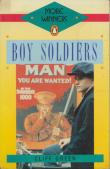AustLit
The material on this page is available to AustLit subscribers. If you are a subscriber or are from a subscribing organisation, please log in to gain full access. To explore options for subscribing to this unique teaching, research, and publishing resource for Australian culture and storytelling, please contact us or find out more.
Latest Issues
Notes
-
Book published in conjunction with the corresponding children's/young adult drama series that was produced by the Australian Children's Television Foundation.
-
Dedication: To David
-
Epigraph: In 1910 the Australian Government passed a law requiring all boys aged between fourteen and seventeen years to register for compulsory military training. Between 1911 and 1915, 34 000 boys were prosecuted for failing to obey this law. This is the story of two such boys.
-
Author's note: Cliff Green wishes to express his gratitude to Mark Joffe, who, as director of the telemovie Boy Soldiers, contributed much to the shaping of the screenplay upon which this book is based.
Publication Details of Only Known VersionEarliest 2 Known Versions of
Other Formats
- Also sound recording.
Works about this Work
-
Attitudes to War in Australian Children's Literature
1994
single work
criticism
— Appears in: Papers : Explorations into Children's Literature , April vol. 5 no. 1 1994; (p. 34-48) O'Sullivan seeks to 'identify attitudes to war in Australian children's literature' in the period 1914-1994, noting in particular the movement from identification with Britain and the Empire in the early decades of this period to an affinity with Asia and the Pacific in the latter decades (34). The discussion begins with a literature review of Australian and overseas critical research in this field and then surveys a large number of (mainly Australian) novels with war as the central/pivotal theme. O'Sullivan concludes that there has been a change in attitudes to war in Australian children's literature, whereby 'once Australia was part of the British Empire and prepared to fight for that anywhere in the world, now multicultural Australia takes a broader view and sees herself as part of a global family' (47). -
Playing Soldiers
1991
single work
review
— Appears in: Northern Perspective , Dry Season vol. 14 no. l 1991; (p. 114-116)
— Review of The Glass Cannon : A Bougainville Diary 1944-45 1990 single work novel ; Boy Soldiers 1990 single work novel -
Untitled
1990
single work
review
— Appears in: Magpies : Talking About Books for Children , November vol. 5 no. 5 1990; (p. 32)
— Review of Boy Soldiers 1990 single work novel -
Untitled
1990
single work
review
— Appears in: The Age , 6 July 1990;
— Review of Boy Soldiers 1990 single work novel
-
Untitled
1990
single work
review
— Appears in: Magpies : Talking About Books for Children , November vol. 5 no. 5 1990; (p. 32)
— Review of Boy Soldiers 1990 single work novel -
Playing Soldiers
1991
single work
review
— Appears in: Northern Perspective , Dry Season vol. 14 no. l 1991; (p. 114-116)
— Review of The Glass Cannon : A Bougainville Diary 1944-45 1990 single work novel ; Boy Soldiers 1990 single work novel -
Untitled
1990
single work
review
— Appears in: The Age , 6 July 1990;
— Review of Boy Soldiers 1990 single work novel -
Attitudes to War in Australian Children's Literature
1994
single work
criticism
— Appears in: Papers : Explorations into Children's Literature , April vol. 5 no. 1 1994; (p. 34-48) O'Sullivan seeks to 'identify attitudes to war in Australian children's literature' in the period 1914-1994, noting in particular the movement from identification with Britain and the Empire in the early decades of this period to an affinity with Asia and the Pacific in the latter decades (34). The discussion begins with a literature review of Australian and overseas critical research in this field and then surveys a large number of (mainly Australian) novels with war as the central/pivotal theme. O'Sullivan concludes that there has been a change in attitudes to war in Australian children's literature, whereby 'once Australia was part of the British Empire and prepared to fight for that anywhere in the world, now multicultural Australia takes a broader view and sees herself as part of a global family' (47).
Last amended 9 Mar 2015 11:34:42
Settings:
- Queenscliff, Queenscliff area (Bellarine Peninsula), Geelong - Terang - Lake Bolac area, Victoria,
- 1910s
Export this record




